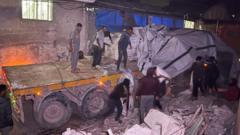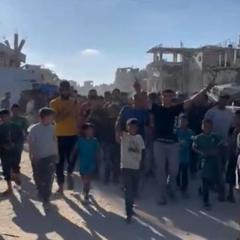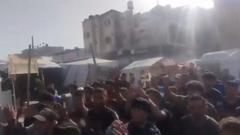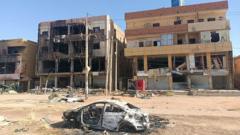Amid ongoing conflict, a fraction of necessary aid begins to flow into Gaza, revealing challenges in delivering aid and alleviating the humanitarian crisis under strict conditions.
Aid Arrivals Surge in Gaza Amid Continuing Humanitarian Crisis

Aid Arrivals Surge in Gaza Amid Continuing Humanitarian Crisis
The U.N. reports initial aid shipments post-blockade, but the demand remains critical as Israel formulates new distribution protocols.
According to the United Nations, approximately 90 truckloads of humanitarian aid began arriving in Gaza on Thursday, marking the first significant influx following a two-month Israeli blockade that exacerbated the region's dire humanitarian situation. The U.N. humanitarian affairs office and the Israeli military confirmed that the supplies are being distributed to warehouses and other strategic locations within Gaza after delays. However, relief agencies quickly emphasized that this shipment represents only a small portion of the urgent supplies needed.
"While the arrival of aid is a step forward, the volume is grossly inadequate. Continuous daily deliveries are essential," stated the World Food Program, a key U.N. agency operating in the region, in a social media post.
The blockade implemented by Israel has led to severe food scarcity in Gaza, a region that has suffered from prolonged conflict with the Palestinian militant group Hamas. Israeli officials defended their two-month ban, stating it aimed to compel Hamas into surrender and secure the release of remaining hostages. They further claimed that Hamas has manipulated aid resources for its benefit, a point that international aid organizations dispute.
Israel conditioned the resumption of humanitarian assistance on the United Nations agreeing to a new distribution method that would allow aid distribution primarily in areas under its security oversight. However, the U.N. and various aid organizations rejected this condition, asserting that it would undermine their operational integrity.
Under increased international scrutiny, Israel announced on Sunday that it would permit the U.N. to dispatch limited quantities of food into Gaza using the previously established mechanism. Nonetheless, negotiations between Israeli authorities and the U.N. delayed the delivery process.
OCHA, the U.N. agency coordinating humanitarian efforts, indicated that the designated route for aid trucks was significantly dangerous. U.N. officials warned that unless modifications were made to their plans, the risk of looting was "extremely likely."
A spokesperson for COGAT, the Israeli military's civil authority managing cooperation with aid organizations, could not be reached for comments.
Amid these developments, Israeli Prime Minister Benjamin Netanyahu reaffirmed during a televised address that military operations against Hamas would intensify unless they complied with Israel's conditions for a cease-fire. He outlined plans for relocating Palestinians to a designated "sterile zone" in southern Gaza, which he claimed would be free of Hamas control, wherein humanitarian aid could be systematically provided.
Netanyahu asserted, "In the end, all regions of the Gaza Strip will fall under Israel’s security management, and Hamas will face total defeat."




















